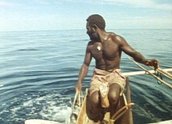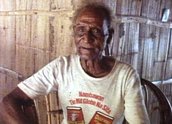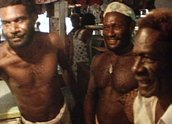


The Sharkcallers of Kontu (1982)
Synopsis
The Sharkcallers of Kontu depicts the ancient tradition of 'sharkcalling’ in the village of Kontu, on the remote west coast of New Ireland in Papua New Guinea. There are only a few men remaining who use magic to call, trap and kill sharks by hand from their small outrigger canoes. Making this very old and extraordinary practice the spine of the film, the filmmaker also weaves in a compelling portrait of the daily life of the villagers. The Sharkcallers of Kontu explores the changes to cultural values and traditional customs wrought by colonisation, alcohol, commerce and Christianity. The film is beautifully shot in an observational style and makes memorable use of archival stills and interviews with villagers. Filmmaker Dennis O’Rourke narrates.
Curator’s notes
From 1974 to 1979, Dennis O’Rourke lived in PNG where he taught documentary filmmaking skills on behalf of the newly independent government. His first film, Yumi Yet – Independence for Papua New Guinea, was completed in 1976, and Ileksen – Politics in Papua New Guinea followed in 1978. While O’Rourke was shooting Ileksen, Steven Madana – press secretary to PNG Prime Minister Michael Somare – suggested he make a film about the sharkcallers of New Ireland, where Madana grew up. So, after O’Rourke finished Ileksen, Madana took him 'home’.
The villagers of Kontu believe that sharks carry the spirits of their ancestors and that sharkcallers, through complex ritual, can call the sharks, capture and kill them without coming to harm. They trust that the sharks will respond to men who call them under the right circumstances. The sharkcallers spend days preparing for the ritual, abstaining from sex and from eating certain foods, and anointing themselves and their canoes with special herbs.
Intending to make an ethnographic-style film, O’Rourke interested the BBC with a pre-sale and received additional funding from the AFC. This enabled him to build a house in Kontu as well as buy film stock, an underwater housing for the camera, a rubber dinghy and an outboard motor. With his wife and young son, O’Rourke lived in the village for six months and shot about 50 rolls of 16mm film. When he returned to Australia and looked at the rushes, he didn’t feel he had captured the story but had run out of money. Luckily, O’Rourke was commissioned to make Yap: How Did You Know We’d Like TV (1980) which allowed him to go back to New Ireland and continue making Sharkcallers.
On his return, O’Rourke met two sharkcallers, Selam and Daulin, who taught him a big lesson. He needed to show the sharkcallers in the context of social change – all around him, the society was exploding from economic, religious and educational pressures. He ditched the underwater housing, gave away the rubber dinghy and put himself in the hands of Selam and Daulin. They offered to build a traditional canoe and help O’Rourke so long as he underwent the traditional sharkcalling preparations.
The filmmaker narrates in an economical, cool and non-judgmental manner. His point of view is in no doubt, however, from the juxtaposition of the scenes. Some of the best segments feature the sharkcallers speaking intimately to him in pidgin about their beliefs while paddling in their canoes. These scenes are contrasted with what is happening in the island community, where O’Rourke shows Pentecostal preaching from the pulpit and the cultural irrelevance of the classroom teaching threatening the survival of traditional customs. When the men in this film are no longer alive, the unique practice of sharkcalling will most likely die with them. O’Rourke later regretted not including more detail about the ritual aspect of the sharkcalling.
Sharkcallers of Kontu screened at the Opera House in 1983 on a double bill with First Contact (1983), which O’Rourke filmed for Robin Anderson and Bob Connolly during the second shoot of The Sharkcallers of Kontu. This was the first time that documentaries were screened at the Opera House and the screenings were a commercial and critical success. O’Rourke donated all the unused rushes from his aborted first filming to the Institute of PNG Studies. Sharkcallers of Kontu won many awards and screened at a number of film festivals around the world.
- Overview
- Curator’s notes
- Video 3 clips

- Principal credits
- Find a copy
- Make a comment
- Map
- Add your review



